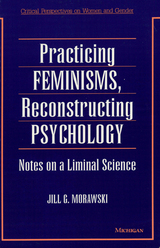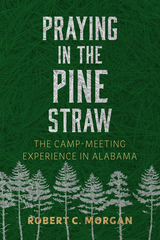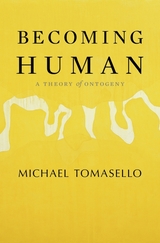
Winner of the William James Book Award
Winner of the Eleanor Maccoby Book Award
“A landmark in our understanding of human development.”
—Paul Harris, author of Trusting What You’re Told
“Magisterial…Makes an impressive argument that most distinctly human traits are established early in childhood and that the general chronology in which these traits appear can…be identified.”
—Wall Street Journal
Virtually all theories of how humans have become such a distinctive species focus on evolution. Becoming Human looks instead to development and reveals how those things that make us unique are constructed during the first seven years of a child’s life.
In this groundbreaking work, Michael Tomasello draws from three decades of experimental research with chimpanzees, bonobos, and children to propose a new framework for psychological growth between birth and seven years of age. He identifies eight pathways that differentiate humans from their primate relatives: social cognition, communication, cultural learning, cooperative thinking, collaboration, prosociality, social norms, and moral identity. In each of these, great apes possess rudimentary abilities, but the maturation of humans’ evolved capacities for shared intentionality transform these abilities into uniquely human cognition and sociality.
“How does human psychological growth run in the first seven years, in particular how does it instill ‘culture’ in us? …Most of all, how does the capacity for shared intentionality and self-regulation evolve in people? This is a very thoughtful and also important book.”
—Tyler Cowen, Marginal Revolution
“Theoretically daring and experimentally ingenious, Becoming Human squarely tackles the abiding question of what makes us human.”
—Susan Gelman
“Destined to become a classic. Anyone who is interested in cognitive science, child development, human evolution, or comparative psychology should read this book.”
—Andrew Meltzoff

In this groundbreaking book, Michael Tomasello presents a comprehensive usage-based theory of language acquisition. Drawing together a vast body of empirical research in cognitive science, linguistics, and developmental psychology, Tomasello demonstrates that we don’t need a self-contained “language instinct” to explain how children learn language. Their linguistic ability is interwoven with other cognitive abilities.
Tomasello argues that the essence of language is its symbolic dimension, which rests on the uniquely human ability to comprehend intention. Grammar emerges as the speakers of a language create linguistic constructions out of recurring sequences of symbols; children pick up these patterns in the buzz of words they hear around them.
All theories of language acquisition assume these fundamental skills of intention-reading and pattern-finding. Some formal linguistic theories posit a second set of acquisition processes to connect somehow with an innate universal grammar. But these extra processes, Tomasello argues, are completely unnecessary—important to save a theory but not to explain the phenomenon.
For all its empirical weaknesses, Chomskian generative grammar has ruled the linguistic world for forty years. Constructing a Language offers a compellingly argued, psychologically sound new vision for the study of language acquisition.

Ambitious and elegant, this book builds a bridge between evolutionary theory and cultural psychology. Michael Tomasello is one of the very few people to have done systematic research on the cognitive capacities of both nonhuman primates and human children. The Cultural Origins of Human Cognition identifies what the differences are, and suggests where they might have come from.
Tomasello argues that the roots of the human capacity for symbol-based culture, and the kind of psychological development that takes place within it, are based in a cluster of uniquely human cognitive capacities that emerge early in human ontogeny. These include capacities for sharing attention with other persons; for understanding that others have intentions of their own; and for imitating, not just what someone else does, but what someone else has intended to do. In his discussions of language, symbolic representation, and cognitive development, Tomasello describes with authority and ingenuity the "ratchet effect" of these capacities working over evolutionary and historical time to create the kind of cultural artifacts and settings within which each new generation of children develops. He also proposes a novel hypothesis, based on processes of social cognition and cultural evolution, about what makes the cognitive representations of humans different from those of other primates.
Lucid, erudite, and passionate, The Cultural Origins of Human Cognition will be essential reading for developmental psychology, animal behavior, and cultural psychology.
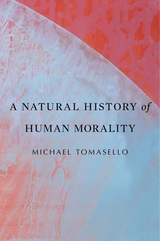
Winner of the Eleanor Maccoby Book Award in Developmental Psychology, American Psychological Association
Winner of a PROSE Award, Association of American Publishers
Shortlist, Cognitive Development Society Book Award
A Choice Outstanding Academic Title of the Year
A Natural History of Human Morality offers the most detailed account to date of the evolution of human moral psychology. Based on extensive experimental data comparing great apes and human children, Michael Tomasello reconstructs how early humans gradually became an ultra-cooperative and, eventually, a moral species.
“Tomasello is convincing, above all, because he has run many of the relevant studies (on chimps, bonobos and children) himself. He concludes by emphasizing the powerful influence of broad cultural groups on modern humans… Tomasello also makes an endearing guide, appearing happily amazed that morality exists at all.”
—Michael Bond, New Scientist
“Most evolutionary theories picture humans as amoral ‘monads’ motivated by self-interest. Tomasello presents an innovative and well-researched, hypothesized natural history of two key evolutionary steps leading to full-blown morality.”
—S. A. Mason, Choice

A Wall Street Journal Favorite Read of the Year
A Guardian Top Science Book of the Year
Tool-making or culture, language or religious belief: ever since Darwin, thinkers have struggled to identify what fundamentally differentiates human beings from other animals. In this much-anticipated book, Michael Tomasello weaves his twenty years of comparative studies of humans and great apes into a compelling argument that cooperative social interaction is the key to our cognitive uniqueness. Once our ancestors learned to put their heads together with others to pursue shared goals, humankind was on an evolutionary path all its own.
“Michael Tomasello is one of the few psychologists to have conducted intensive research on both human children and chimpanzees, and A Natural History of Human Thinking reflects not only the insights enabled by such cross-species comparisons but also the wisdom of a researcher who appreciates the need for asking questions whose answers generate biological insight. His book helps us to understand the differences, as well as the similarities, between human brains and other brains.”
—David P. Barash, Wall Street Journal
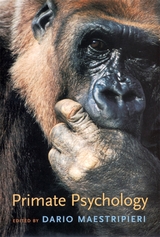
In more ways than we may sometimes care to acknowledge, the human being is just another primate--it is certainly only very rarely that researchers into cognition, emotion, personality, and behavior in our species and in other primates come together to compare notes and share insights. This book, one of the few comprehensive attempts at integrating behavioral research into human and nonhuman primates, does precisely that--and in doing so, offers a clear, in-depth look at the mutually enlightening work being done in psychology and primatology.
Relying on theories of behavior derived from psychology rather than ecology or biological anthropology, the authors, internationally known experts in primatology and psychology, focus primarily on social processes in areas including aggression, conflict resolution, sexuality, attachment, parenting, social development and affiliation, cognitive development, social cognition, personality, emotions, vocal and nonvocal communication, cognitive neuroscience, and psychopathology. They show nonhuman primates to be far more complex, cognitively and emotionally, than was once supposed, with provocative implications for our understanding of supposedly unique human characteristics. Arguing that both human and nonhuman primates are distinctive for their wide range of context-sensitive behaviors, their work makes a powerful case for the future integration of human and primate behavioral research.
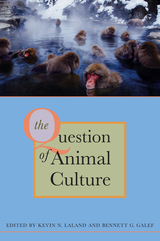
READERS
Browse our collection.
PUBLISHERS
See BiblioVault's publisher services.
STUDENT SERVICES
Files for college accessibility offices.
UChicago Accessibility Resources
home | accessibility | search | about | contact us
BiblioVault ® 2001 - 2025
The University of Chicago Press



